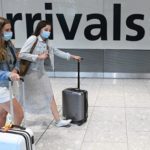 International travellers will be required to undergo a 72-hour self-isolation period upon arrival in Australia considering the finding of a new form of COVID-19, the Australian government has announced.
International travellers will be required to undergo a 72-hour self-isolation period upon arrival in Australia considering the finding of a new form of COVID-19, the Australian government has announced.
The quarantine period for arrivals from nine countries will also be extended to 14 days for those from South Africa, Namibia, and Zimbabwe; Botswana; Lesotho; Eswatini; The Seychelles; Malawi and Mozambique.
Flights to and from these countries have been temporarily suspended.
An additional requirement has been added to the existing entry requirements, including proof of vaccination and a negative PCR test result for all arrivals.
New South Wales, Victoria and the Australian Capital Territory (ACT) have opened their borders to fully vaccinated overseas arrivals without the need for quarantine.
Omicron, a new strain discovered in South Africa, has been labelled a “variant of concern” by the World Health Organization, which made the announcement on Friday, November 26.
Even though they had a negative pre-flight test and had been fully vaccinated against COVID-19, two passengers who flew in from southern Africa tested positive for the mutated virus, indicating that Omicron had already arrived in Australia. The passengers were asymptomatic,
Passengers aboard Qatar Airways flight QR908 from Doha to Sydney arrived in Australia at around 7 p.m. local time on Saturday. On Sunday, the Omicron variant had a positive result.
According to NSW Health, even if a COVID test comes back negative, all 260 people on board the flight are now considered close contacts and must be isolated for 14 days.
As a further precaution, 12 of those on board the trip from southern Africa have been placed in the required 14-day hotel quarantine.
On Saturday, Chief Medical Officer Paul Kelly stated that roughly 100 additional people who had arrived in NSW, ACT, and Victoria from countries of concern were now being placed in hotel quarantine.
“The most critical step is a 14-day quarantine under medical supervision. According to Professor Kelly, states will have the last say on implementing the quarantine, whether it takes place at home or in a hotel room.
When medical data demonstrates that more actions are necessary, “we will not hesitate to take them, and that may mean reinforcing or increasing the limits,” he said.
“The world is going to learn a lot in the next few days.”
With the emergence of the Omicron variant, the states’ plans to reopen their domestic borders have been called into question.
Despite concerns about the new variant, the Queensland government has adhered to its decision to reopen the state’s border with New South Wales and Victoria on December 17. Officials said they would closely monitor the situation in the southern states.
It has been confirmed that there would be no change in reopening plans in Queensland, despite the federal government’s modifications for overseas visitors, according to Queensland’s acting Chief Health Officer Peter Aitken on Sunday.
When it comes to dealing with this new virus, “these are all appropriate steps to give us time,” Dr Aitken said. “At this moment, this is a new virus, and we don’t know the details of what it means for our communities or anyone else,” he continued.
It’s important to be careful, but we don’t need to be alarmed.”
Mark McGowan, the premier of Western Australia, has stated that he will not hesitate to extend the border closures with the eastern states over Omicron concerns.
“The quarantine system for hotels in NSW has been removed. According to McGowan, “It’s a major risk, and that’s why we’ve been careful about other states.”
If you limit the flow of individuals coming into the country, you effectively eliminate the possibility of the virus making its way here.
Source: Australian Aviation


















